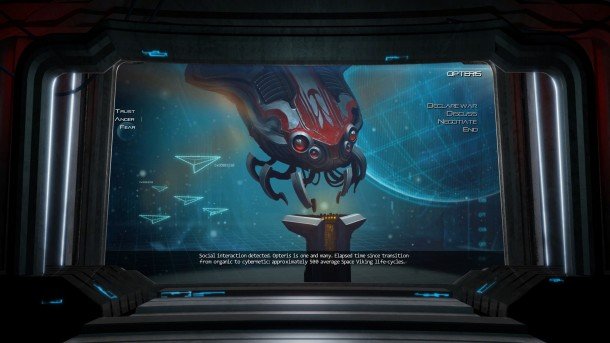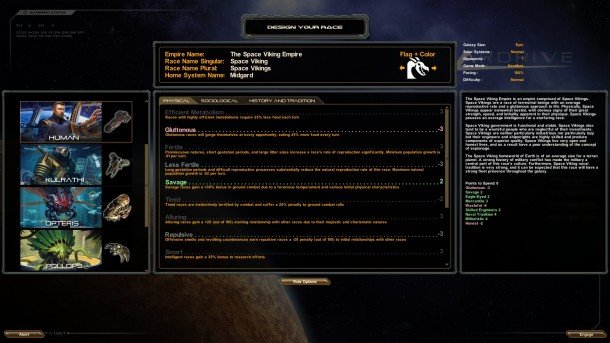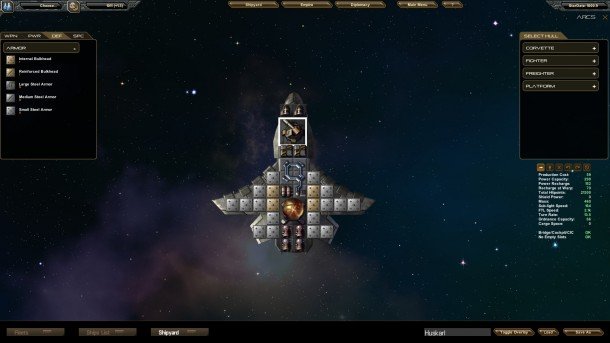
When the Borg-like space cicadas dispatch an invasion fleet to your undefended mining colony in the border systems, all you can really do is hope that your samurai bear allies will warp to your aid in time. Such are the crises you will find yourself dealing with in StarDrive, an indie, star-faring, real-time 4X that was Kickstarted earlier this year. I was given the chance to command a stellar empire in the latest beta build, and also got to chat with developer Daniel DiCiccio.
DiCiccio didn't hesitate to use the term "grand strategy" in describing StarDrive. It's a term that makes my ears perk up, and a subgenre mostly dominated by the likes of Civilization, and Paradox Development Studio's various historical titles (Crusader Kings, Europa Universalis, et al.) Like a Paradox grand strategy game, it uses pausable real-time, with ships moving around the galatic map as smoothly and seamlessly as in an RTS. A lot of the behind-the-scenes stuff, like economy and construction, takes place on 10-second ticks.
Your ultimate goal is to go from a single planet in a single solar system to a vast, galactic empire. Even on the smaller maps, there are dozens of star systems to explore. Each is home to a handful of planets—some habitable, some not—that can be exploited for varying amounts of the main resources: production, science, and food. As you make your way from star to star, colonizing new planets, researching new technologies, and building trade and military fleets, you will be working toward either a military or political victory. The former is the fairly straightforward: "Blow up anything that looks funny." The latter tasks you with uniting all remaining races (meaning, minus the ones that have to be destroyed due to non-cooperation) into a single federation using a Civilization-like diplomacy system.

Empire creation is reminiscent of Masters of Orion 2 (a big influence on the game in general, according to Diciccio, and it shows.) You can start with one of eight racial templates, which define what your ships and infantry look like, and then use a point-buy system to add positive and negative traits from Physical, Sociological, and Tradition groups. Using humans as a template, I created the Space Viking Empire: Savage, Fierce, Eagle-Eyed merchants with a strong Military and Naval tradition, as well as Skilled Engineers. To balance out the deficit, I made them Gluttonous, Honest, and Wasteful. (Yeah, Vikings were anything but wasteful, but I had to get those points in there somehow.)
Once you've created your empire, you begin with one core planet, typically very fertile and lucrative. Using scout ships, you will warp to nearby stars looking for more planets to colonize. Colonies are the core economic engine of the game, but most of the planets you'll come across are initially too barren to support much immigration or industry. You'll have to research and build bioshperes (and later, terraforming engines) to make them livable. This causes already-fertile worlds to be very valuable and contested in the early game.
Coming into contact with another empire will bring up a diplomacy screen, which allows you to trade techs, sign non-aggression pacts, open your borders, form mutually-beneficial alliances and trade agreements, or simply go to war. The likelihood that an AI race will cooperate is determined by three stats: Trust, Fear, and Anger. In general, it seemed like at least two thirds of the races currently in the game are huge jerks who will never trust you enough to do anything besides start a war. The exceptions (the introspective samurai space bears known as the Kurathi, and a generally cheerful, plant-based species called the Pollops) make very valuable friends.

StarDrive also features an in-depth ship customization system. Each hull type (unlocked with research, and ranging from small fighters all the way up to massive capital ships) has a grid overlay on which you can place weaponry, internal storage, power generation, armor, and many other module types. My most successful design was the Longship: a stock trade trade freighter with some of its internal storage removed to make way for more power generation and warp engines. Despite a lower capacity for goods, they zipped between star systems with such speed and agility that my mercantile Space Vikings had the most efficient trade network in the galaxy. Experiments to see how many guns I could fit onto an assault frigate at the expense of everything else resulted in ponderous, frail, and ineffective wastes of metal.
Keep up to date with the most important stories and the best deals, as picked by the PC Gamer team.
If I had to name one criticism so far, it's that the pace is a little bit more on the RTS side—not unlike Sins of a Solar Empire—than what you would typically dub "Grand Strategy." Being able to seamlessly zoom from galaxy view down to a battle taking place between two opposing fighter squadrons in real time is pretty awesome, but even on the largest map size, I didn't get the sense that this is the kind of game where one campaign could last for dozens of hours. I did play on x4 speed quite a bit when nothing was happening, but that's pretty standard in this sort of game.
StarDrive is coming together to be a more than competent RTS/4X with lots of depth, breadth, and customization. Still, I found myself craving something grander—at least chronologically. The "long game" is more akin to a build order in StarCraft than the miles-ahead planning you undertake in a game of Civilization or Crusader Kings. Multiplayer is also currently lacking, which is a shame, given that the somewhat faster pace would lend itself well to several human-controlled empires vying for power (not to mention solving the issue of so many of the AI civs just being impossible to negotiate with.)
You can pre-order StarDrive now and get immediate beta access, if you'd like to see it for yourself. Whatever you do, don't tick off the Opteris.
Len Hafer is a freelancer and lifelong PC gamer with a specialty in strategy, RPGs, horror, and survival games. A chance encounter with Warcraft 2: Tides of Darkness changed her life forever. Today, her favorites include the grand strategy games from Paradox Interactive like Crusader Kings and Europa Universalis, and thought-provoking, story-rich RPGs like Persona 5 and Disco Elysium. She also loves history, hiking in the mountains of Colorado, and heavy metal music.

